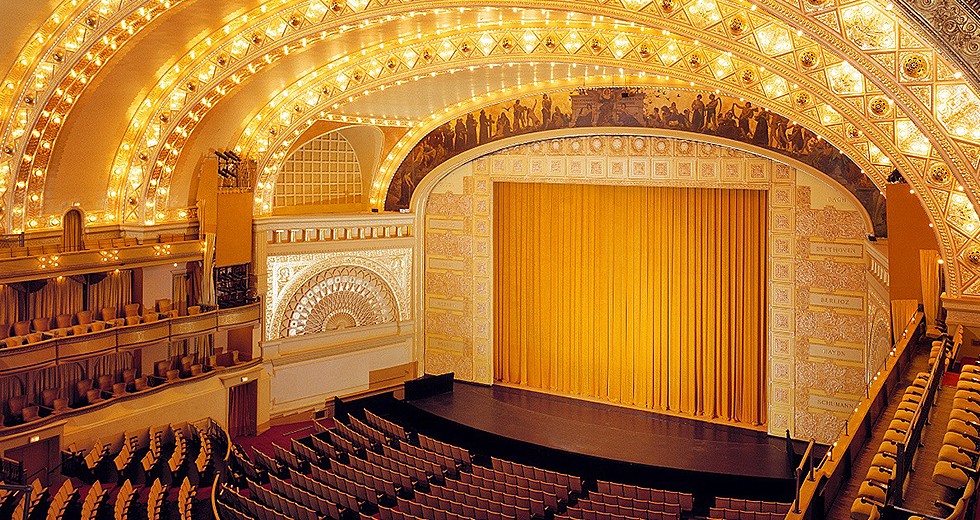
It’s rare outside Vienna that concertgoers might hear two hometown orchestras in two historic halls in just one day.
And Chicago gets the opportunity this Friday.
In a happy confluence of spring and summer music seasons, the CSO’s final programs this season at 110-year-old Orchestra Hall overlap with the first two weeks of the annual Grant Park Music Festival.
Another rare musical confluence — blues and classical grooving on each other’s vibes, unintentionally, at Grant and Millennium parks’ adjacent bandshells — encouraged Grant Park administrators to seek peace inside the 125-year-old Auditorium Theatre, 50 E. Congress.
(Otis Taylor and Chicago Blues Festival fans — the Friday night outdoors is now all yours, so when the “Sun goes out, you’ll be standing all alone.”)
Classical fans are big winners, starting with a matinee performance of Viennese gems at Orchestra Hall. CSO Music Director Riccardo Muti begins the afternoon in one of the final concerts of his five-month traversal of Schubert’s nine symphonies, closing with the majestic First (1813) and lively Sixth (1818). In between, Principal Bassoon David McGill offers Mozartean leberkäse for Schubert’s symphonic semmel in the 1774 Bassoon Concerto.
Then it’s a two-block walk down Michigan Avenue for Berlioz’s Roméo et Juliette, beginning at 6:30 p.m. The French composer’s 100-minute choral symphony, from 1839, is grandly scaled for Grant Park’s generous forces and the Auditorium Theatre’s 3,877 seats — easily 50 percent larger than Orchestra Hall, which holds 2,522.
Grant Park’s players are no strangers to CSO patrons. Carlos Kalmar, Grant Park’s artistic director and principal conductor, made his Orchestra Hall debut in 2010. Bass-baritone Eric Owens completes the only hat trick that Chicagoans will see this June — his bow at Auditorium Theatre caps a year with star turns in Dvořák’s Rusalka at Civic Opera House (Chicago’s 85-year-old newcomer with 3,563 seats) and last month’s memorable Schubert recital at Orchestra Hall. He also will appear in the CSO’s season-opening performances of Beethoven’s Ninth Symphony in September.
The CSO has strong roots at both Michigan Avenue stages, dating to each venue’s origins. Celebrated architects Dankmar Adler and Louis Sullivan completed Auditorium Theatre in 1889, then the world’s most technically advanced venue, and an innovative German conductor making his American rounds, Theodore Thomas, led a new band called the Chicago Orchestra in its first concerts there two years later.
The Auditorium became Chicago Orchestra’s home for its first 13 seasons. Thomas, the new orchestra’s first music director, introduced music from Berlioz’s Roméo et Juliette in his first year at the helm.
Now 110 seasons post-departure, it’s still debated about why Chicago’s then favorite maestro moved America’s best orchestra from the world’s greatest theater. Thomas and his Chicago musicians decamped to Orchestra Hall, architect Daniel Burnham’s new Michigan Avenue jewel, in 1904. Would it have killed Thomas to stay at the acoustically brilliant Auditorium Theatre? The move to Orchestra Hall took a toll: He was dead of pneumonia three weeks after a drafty December dedicatory concert.
You’ll fare better with both halls this Friday. Plus, Grant Park Music Festival programs are always free and open to all comers, even at the Auditorium Theatre.
Buy one Friday, get one free.
Postscript: Still jazzed after a day of Mozart, Schubert and Berlioz? Rush back to Orchestra Hall for a jazz nightcap. Jon Faddis’ Triumph of Trumpets kicks off at 8 p.m, with Marcus Roberts and the Modern Jazz Generation right after. (If you’re cash-strapped, head across to Grant Park for the Siegel-Schwall Blues Band’s late set at the Blues Festival.)
Andrew Huckman is a Chicago-based writer and lawyer.